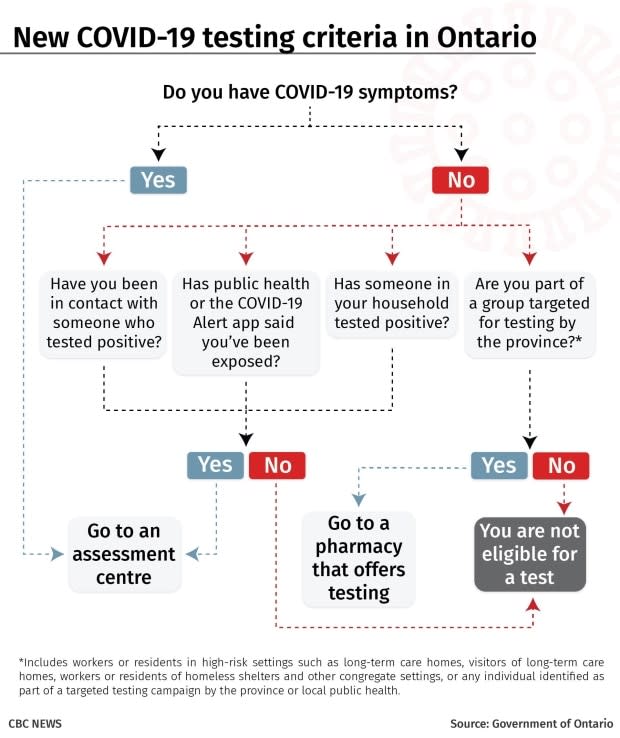Confused about COVID-19 testing guidelines? Find out if you should get tested
The landscape around COVID-19 testing in Ontario has gotten more complicated in recent days.
While it was once the case that anyone could head to an assessment centre and get a test (in fact, provincial officials spent months advocating that people do just that), things have changed as demand has surged.
The government said earlier this week that low-risk asymptomatic people can get appointment-only tests at up to 60 pharmacies but clarified Thursday that the initiative would only apply to certain individuals, such as those with loved ones in long-term care homes or close contacts of a case.
That means some people with no symptoms who are simply seeking reassurance they don't have the virus will not be able to access testing offered by the government.
Meanwhile, assessment centres will be reserved for people with symptoms — and several other specific instances.
Here's your guide for where you should get tested for COVID-19 in Ontario.
I have COVID-19 symptoms. Where do I go?
Go to an assessment centre.
I have no symptoms but have been in contact with someone who has COVID-19. Where should I go?
You can go to an assessment centre.
I have no symptoms, but I want a test anyway. Where should I go?
The province is no longer offering testing for asymptomatic people who are seeking reassurance that they don't have the virus.
What if I get an alert from public health or the COVID-19 app about a possible exposure?
Then you should go to an assessment centre.
Someone in my household tested positive. Where do I go?
Go to an assessment centre.
I'm considered part of a COVID-19 outbreak. Where should I go?
To an assessment centre.
So who can get tested at pharmacies?
According to the province, people can get tested for COVID-19 at select pharmacies if they are not showing symptoms and are "eligible for testing as part of a targeted testing initiative directed by the Ministry of Health or the Ministry of Long-Term Care."
That includes:
Workers or residents of high-risk settings like long-term care homes.
Visitors of long-term care homes.
Workers or residents of homeless shelters and other congregate settings.
Health Minister Christine Elliott has also said teachers would be able to get tested at pharmacies.
The province has said that testing will be available at 60 pharmacies by week's end, with a plan to expand the initiative later — although representatives at some pharmacies on the list have told CBC News they will not be ready by Friday.
Premier Doug Ford said that next week, up to 18 more pharmacies in southwestern Ontario and Niagara Region will start offering tests, in places like St. Catharines-Niagara Falls, London, Windsor, Sarnia, Kitchener-Waterloo, Cambridge, and more.
You can also use the province's online assessment tool to help point you in the right direction.


